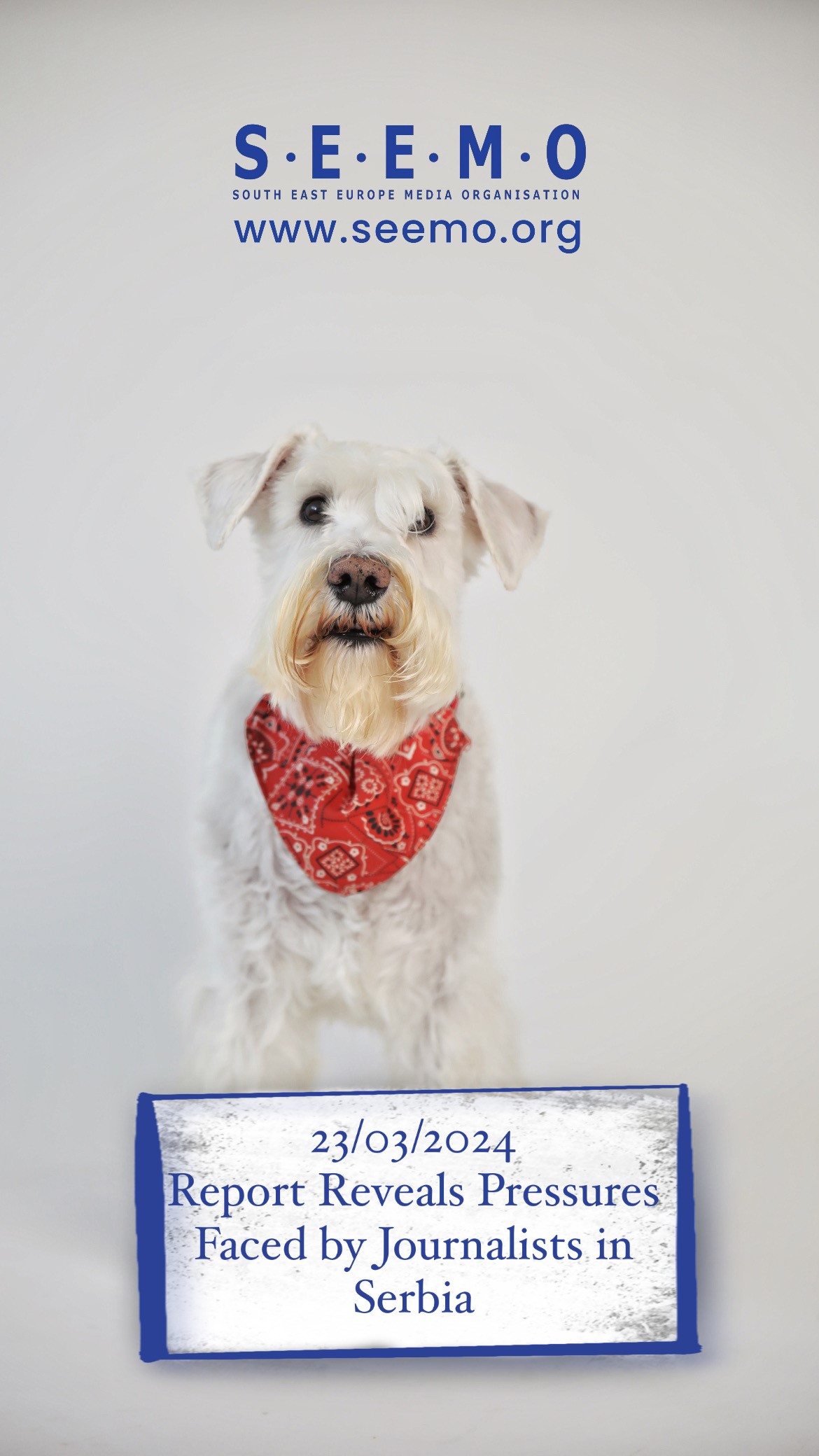A recent report sheds light on the myriad challenges journalists in Serbia encounter in their line of work.
Journalists in Serbia assess the reaction of state authorities in cases of reported security threats as inadequate (90%), and 75% of respondents say that the attitude of state authorities towards them (when they reported threats) was more or less negative. Among journalists who have experienced threats due to their work in the past year, the largest number of threats came either from anonymous senders (14.1%) or from people who declare themselves as supporters of a political party (14.1%), followed by threats from public officials (13.1%) and ordinary citizens (13.1%), and 12.1% of journalists who were threatened received these threats from politicians.
Journalists identify the origins of threats in the hindrance of text or article publication, (35%) of documented instances, or influence on media content (32.5%). Among those subjected to threats, attacks, and pressures, one in four attested to a discernible impact on their physical health (25%). Additionally, 40% reported observable modifications in behaviour, characterised by heightened states of anxiety, discomfort, and trepidation. Moreover, 20% acknowledged a reduction in job satisfaction stemming from these.
According to the findings, institutional pressures rank as the most common threat, affecting 46.2% of journalists, followed closely by economic pressures and job insecurity at 40.2%. Targeting and smear campaigns affect 29.9% of journalists, while 30.5% face verbal threats regularly. Shockingly, 17.1% of journalists have experienced Strategic Lawsuits Against Public Participation (SLAPPs). Digital violence has impacted 39.2% of journalists surveyed. Notably, over half of journalists (53.8%) have refrained from reporting on certain topics due to fears, with women journalists reporting higher instances.
39.5% of journalists admitted that they had repeatedly decided not to report on a topic or event, and another 14.3% stated that they had once been in such a situation. This means that a majority of journalists (53.8%) stated that they were in a situation where they did not report on a topic or event once or more, and 43.7 journalists did not report such experience. This question was not answered by 2.5% of journalists. Women journalists report above average that they have been in this situation once or more.
Conversely, a significant majority of journalists (68.7%) asserted that self-censorship has had an impact on both their professional undertakings and the quality of information conveyed to the public, of which 28.1% refraining from publishing intended stories, 26.6% stated that selfcensorship limited the scope and importance of the story, and for 14.1% self-censorship resulted in an absence of vital information for the public.
The report was developed as part of the action “Protecting freedom of expression and of the media in Serbia (PROFREX)” under the Council of Europe’s Division for Co-operation on Freedom of Expression and prepared with the support of the Council of Europe and European Union. The report was conducted in collaboration with the Journalists Association of Serbia (UNS – https://uns.org.rs/) and the Independent Journalists Association of Serbia (NUNS – https://nuns.rs/). The survey involved 130 journalists and media employees. By delving into these complex dynamics, the report seeks to enhance understanding of the challenges journalists face in Serbia’s media landscape. In an era dominated by digital communication, safeguarding freedom of expression is paramount. Recognizing and addressing covert pressures like self-censorship is essential for upholding journalistic integrity and preserving democratic values.
The report is online:
https://rm.coe.int/hf42-research-threats-attacks-on-journalists/1680aee322
The South East Europe Media Organisation (SEEMO) underscores the paramount importance of safeguarding freedom of expression and protecting journalists’ rights. The prevalence of institutional pressures, economic insecurities, and digital violence underscores the urgent need for robust measures to defend press freedom. SEEMO reaffirms its commitment to advocating for the rights of journalists and ensuring their safety in the pursuit of truth and transparency. Without unfettered access to information and the ability to report freely, democratic values are jeopardized, and societal progress hindered. SEEMO calls upon authorities and stakeholders to address these issues promptly and comprehensively, fostering an environment where journalists can work without fear of reprisal or censorship.
South East Europe Media Organisation (SEEMO) is a regional non-governmental, non profit network of editors, media executives and leading journalists in Southeast, South, East and Central Europe. SEEMO members are in Albania, Armenia, Azerbaijan, Belarus, Bosnia-Herzegovina, Bulgaria, Croatia, Cyprus, Czech Republic, Estonia, Georgia, Greece, Hungary, Kazakhstan, Kosovo, Kyrgyzstan, Latvia, Lithuania, Malta, Moldova (with the territory of Transdnestria), Montenegro, North Macedonia, Poland, Romania, Russia, Serbia, Slovakia, Slovenia, Tajikistan, Turkmenistan, Türkiye / Turkey, Ukraine and Uzbekistan. Austria, Italy, Vatican and San Marino have a special status in SEEMO. SEEMO has over 3000 individual members, and additional media as corporate members.
#fyp #mediafreedom #seemo #freespeech #southeasteuropemediaorganisation #ngo #journalist #serbia #coe #eu #slapp #journalistattacked #SEEMO #pressfreedom #mediafreedom #freemedia

